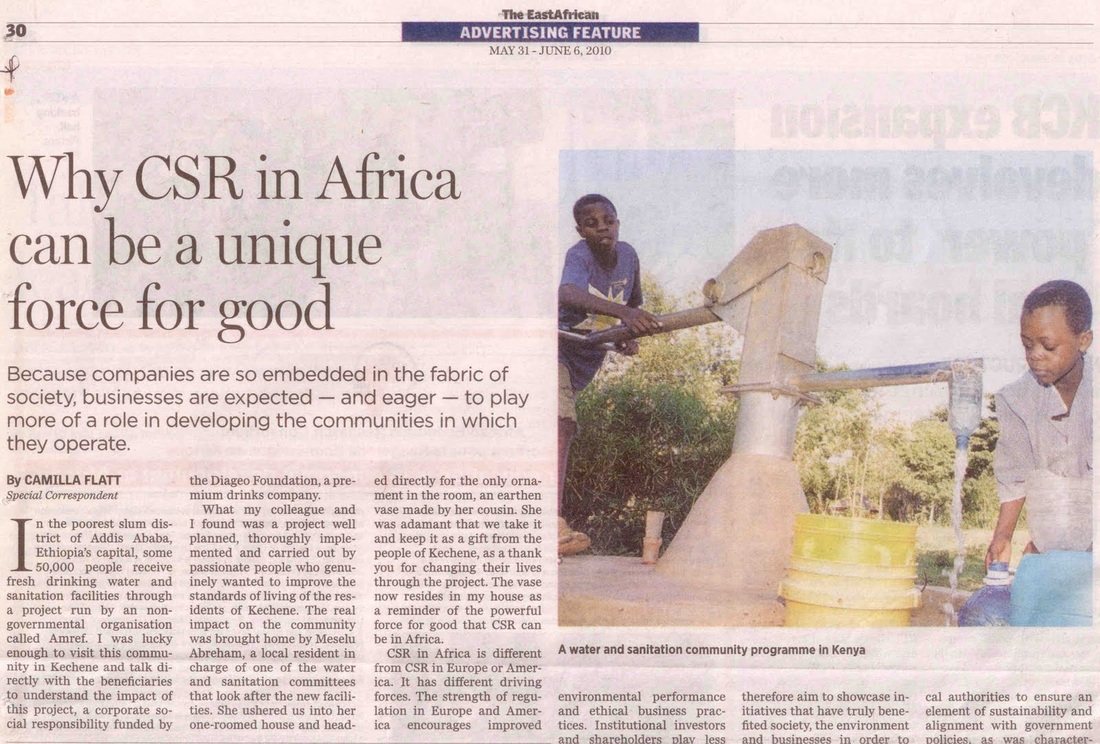Solutions for Corporate Strategy & Sustainability in Africa
Africa Intercultural Consulting helps client companies develop and implement sustainable, socially responsible and culturally focused programs targeting education, healthcare, infrastructure and community development.
Our CSR program advises clients on best practices, compliance issues, use and development of local content and host government requirements (e.g. foreign exchange controls) to mitigate risks and create sustainable value to the economy and people of African host countries.
Our CSR program advises clients on best practices, compliance issues, use and development of local content and host government requirements (e.g. foreign exchange controls) to mitigate risks and create sustainable value to the economy and people of African host countries.
Guiding principle

Companies should have 'a broad and deep involvement with the societies in which they do business.'
- Sir Ernest Oppenheimer
CSR in Africa is different from CSR in Europe or America. It has different driving forces. The strength of regulation in Europe and America encourages improved environmental performance and ethical business practices. Institutional investors and shareholders play less of a role in how the companies they invest in behave. The level of environmental and social awareness from consumers and employees is not at the same intensity and expectations about how businesses should operate are different. Interestingly in Africa, because companies are so embedded in the fabric of society, businesses are expected-and eager- to play more of a role in developing the communities in which they operate.
Consequently, there is a large difference in the potential for impact of CSR in Africa compared to more developed countries. Because of these differences, there has been an encouraging debate about what exactly is CSR in Africa. Is it just window dressing to improve corporate reputation or does it really add value to the company’s financial bottom line and the community at large?
The EastAfrican newspaper, June 2010
- Sir Ernest Oppenheimer
CSR in Africa is different from CSR in Europe or America. It has different driving forces. The strength of regulation in Europe and America encourages improved environmental performance and ethical business practices. Institutional investors and shareholders play less of a role in how the companies they invest in behave. The level of environmental and social awareness from consumers and employees is not at the same intensity and expectations about how businesses should operate are different. Interestingly in Africa, because companies are so embedded in the fabric of society, businesses are expected-and eager- to play more of a role in developing the communities in which they operate.
Consequently, there is a large difference in the potential for impact of CSR in Africa compared to more developed countries. Because of these differences, there has been an encouraging debate about what exactly is CSR in Africa. Is it just window dressing to improve corporate reputation or does it really add value to the company’s financial bottom line and the community at large?
The EastAfrican newspaper, June 2010
Key Stakeholders

We guide corporate clients to take a pro-‐active role in strategically engaging with key community stakeholders (e.g. ethnic chiefs) to promote communication, collaboration and mutual benefit.
We help client companies understand the importance and legitimacy of traditional structures (e.g. community, ethnicity, leadership) while providing strategic advice on building alliances, local partners and addressing the social needs of community stakeholders.
We help client companies contribute to the economic strength of a country by guiding and advising on job creation, educational needs and healthcare programs that provide sustainable benefits to the people and communities in which they operate.
We develop country-‐specific plans to help client companies comply with requirements of African host governments (e.g. use and development of local content). These plans enable our clients to support the development of local citizens, businesses and community stakeholders.
We help client companies understand the importance and legitimacy of traditional structures (e.g. community, ethnicity, leadership) while providing strategic advice on building alliances, local partners and addressing the social needs of community stakeholders.
We help client companies contribute to the economic strength of a country by guiding and advising on job creation, educational needs and healthcare programs that provide sustainable benefits to the people and communities in which they operate.
We develop country-‐specific plans to help client companies comply with requirements of African host governments (e.g. use and development of local content). These plans enable our clients to support the development of local citizens, businesses and community stakeholders.

